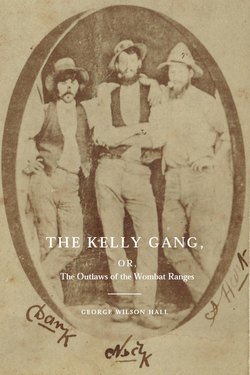Читать книгу The Kelly Gang - George Wilson Hall - Страница 11
На сайте Литреса книга снята с продажи.
CHAPTER VII
Оглавление“He was a pal o’mine,
My dear boy –”
– Modern Song
Edward Kelly was at one time charged with being an accomplice and mate of the notorious Harry Power, who for so many years, though ill and long past middle age, bid defiance, single handed, to the police in the North-Eastern District, but for reasons which it would be a breach of confidence to both sides to reveal, sufficient evidence was brought forward to ensure his conviction.
Power, in conversation with “the Vagabond”, at Pentridge, stigmatized Edward Kelly as cowardly and bloodthirsty, and said that he was afraid to perform the simple act of holding his (Power’s) horse outside the Seymour bank, as he proposed, while he went in and robbed it. He also stated that he once prevented Kelly from shooting a harmless traveller, on the road between Benalla and Mansfield, out of mere devilment.
But it must be remembered, in receiving and weighing these accusations, that Power was under the impression that he was “sold” by, and owed his capture to, Kelly, though a greater mistake never was made, for the man who pocketed the price of Power’s wretched carcase lived but a short time to enjoy the reward of an approving conscience, backed up by the comparatively trifling but somewhat comforting accompaniment of a few hundred pounds sterling, Government money.
There is every reason to believe – in fact, we know – that Ned Kelly was for some time associated with Power in his predatory excursions, though the fellowship could not have proved a very remunerative one, for it is calculated that, while trading alone, the elder partner of the firm did not average £1 per week, clear.
About the end of 1869, or the beginning of 1870, some horses being suddenly missing from Mount Battery Station, near Mansfield, then owned by John. P. Rowe, and Power being abroad, the loss was at once set down to his agency, and accordingly a party, including two constables, was organized at the station, and the track of the stolen animals followed for some distance towards the head of the King River, where they were finally lost sight of. It is believed by many that at one time, the party being unpleasantly close to Power and his then mate, Ned Kelly, the latter proposed to surrender, and that the elder bushranger, threatened to blow his brains out if he attempted it. The subsequent and recent proceedings of Ned Kelly, however, could apparently give the lie to the story.
About this date, one day shortly after noon, two men, armed with guns, made their appearance of the highest verge of a rocky and nearly perpendicular declivity, nearly overhanging and within rifle shot of the Mount Battery homestead. On the alarm being given, Rowe turned out with a rifle, and a friend of his (who had been lunching at the house) with a smooth-bore loaded with ball, to take stock of the doubtful visitors, the shorter of whom, as far as distance would permit judging, answered the description of the then dreaded Power, but the other, who was tall, and at that time rather slight, defied recognition, while the wildest and most improbably conjectures were suggested as to his identity. This youth actually was Ned Kelly, though, for the matter of that, it is not now known for certain, except to a comparatively few, who either of the strangers was. As soon as Rowe had taken a good look at the excursionists, who appeared to be carefully examining the house and grounds, he raised his rifle and let drive at them, without the formality of a challenge or salute of any kind, an example that was quickly followed by his friend, in the same reckless, and, as we consider, altogether lawless manner. The first shot missed them, and the second, as Sir Boyle Roche would have said, hit them in the same place, producing no further effect than inducing Kelly to raise his gun and take a steady aim at the two, but before any mischief ensued, Power threw up the muzzle of the gun, and persuaded him to retire without firing. They then quickly disappeared from the view of the Battery garrison, and, mounting their horses, which were secured hard by, rode off at full speed towards the King River, which they reached that evening, and rested at Power’s gunyah, near Quin’s Station, so as to baffle the pursuit which they anticipated, and which did take place, with the almost inevitable result in such cases.
There was a good deal of excitement about the affair for a day or two at Mansfield, which soon died out, but the general verdict was that Rowe was not justified in firing at men who, for all he knew, might have been nothing more than harmless travellers.
We must now return to the proceedings of the most prominent characters in our history, and follow them to their lurking places in the Wombat Ranges.
